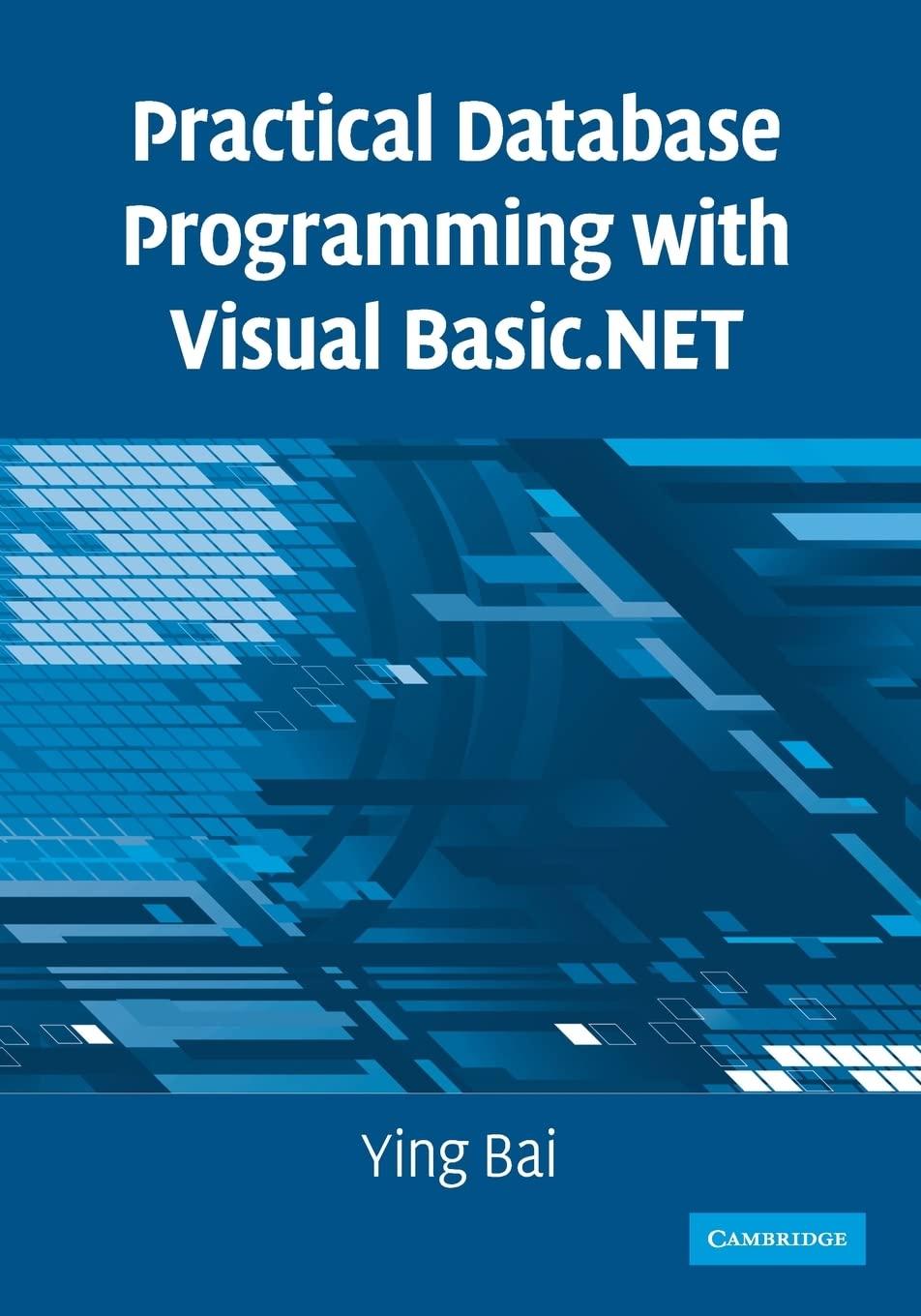Question
I need help cleaning my c++ code for mystring.cpp. I was told my boolean function could be simplified to basically 1 line of strcmp function,
I need help cleaning my c++ code for mystring.cpp. I was told my boolean function could be simplified to basically 1 line of strcmp function, but I'm not sure how to do that. Also I need help with my mystring::replace function simplification. Thank you!
=====================================================================
#include "mystring.h"
// default constructor mystring::mystring() { ptr_buffer = new char[1]; *ptr_buffer = '\0'; buf_size = 1; len = 0; }
// constructor from c-style string mystring::mystring(const char * s) { len = strlen(s); buf_size = len + 1; ptr_buffer = new char[buf_size]; strcpy(ptr_buffer, s);
}
// copy constructor mystring::mystring(const mystring& orig) { len = orig.length(); ptr_buffer = new char[len+1]; buf_size = len+1; strcpy(ptr_buffer, orig.ptr_buffer); }
//Overload operators mystring objects can be manipulated as 1st class objects. mystring& mystring::operator=(const mystring& orig) { delete [] ptr_buffer; len = orig.length(); ptr_buffer = new char[len+1]; buf_size = len+1; strcpy(ptr_buffer, orig.ptr_buffer); }
mystring& mystring::operator=(const char* orig) { delete [] ptr_buffer; len = strlen(orig); buf_size = len + 1; ptr_buffer = new char[buf_size]; strcpy(ptr_buffer, orig); }
char mystring::operator[](size_type pos) const { return ptr_buffer[pos]; }
char& mystring::operator[](size_type pos) { return ptr_buffer[pos]; }
mystring& mystring::operator+=(const mystring& str) { this->append(str); return *this; }
mystring& mystring::operator+=(const char* str) { this->append(str); return *this; }
//Methods for modifying mystring objects with other mystring objects and c-style strings. void mystring::clear() { len = 0; ptr_buffer[0] = '\0'; }
void mystring::push_back(char c) { reserve(len + 1); ptr_buffer[len] = c; ptr_buffer[len + 1] = '\0'; len++; }
mystring& mystring::append(const mystring& str) { return append(str.c_str()); }
mystring& mystring::append(const char* str) { int size = strlen(str); reserve(size + len); strcat(ptr_buffer, str); len += size; return *this; }
mystring& mystring::insert(size_type pos, const mystring& str) { return insert(pos, str.c_str()); }
mystring& mystring::insert(size_type pos, const char* str) { int size = strlen(str); reserve(len + size); mystring b(ptr_buffer + pos); for (int i = 0; i <= size; ++i) { ptr_buffer[i + len] = str[i]; } len = (pos + size); append(b); return *this; }
mystring& mystring::replace(size_type start, size_type span, const mystring& str) { char* temp = new char[buf_size]; for(int c = 0; c < buf_size; c++) { if(c >= start && (c-start) < span && str[c-start] != '\0') temp[c] = str[c-start]; if(c < start || c >= (start + span)) temp[c] = ptr_buffer[c]; } temp[buf_size-1] = '\0'; delete [] ptr_buffer; ptr_buffer = temp; temp = NULL; }
mystring& mystring::replace(size_type start, size_type span, const char* str) { char* temp = new char[buf_size]; for(int c = 0; c < buf_size; c++) { if(c >= start && (c-start) < span && str[c-start] != '\0') temp[c] = str[c-start]; if(c < start || c >= (start + span)) temp[c] = ptr_buffer[c]; } temp[buf_size-1] = '\0'; delete [] ptr_buffer; ptr_buffer = temp; temp = NULL; }
void mystring::reserve(size_type n) { if(n < (len + 1)) return; buf_size = n; len = buf_size - 1; char* temp = new char[buf_size]; strcpy(temp, ptr_buffer); delete [] ptr_buffer; ptr_buffer = temp; temp = NULL; }
//Methods to view properties of mystring objects. mystring::size_type mystring::size() const { return len; } mystring::size_type mystring::length() const { return len; } mystring::size_type mystring::capacity() const { return buf_size; } mystring::size_type mystring::max_size() const { return (int)pow(2,30) -4 ; }
bool mystring::empty() const { if(len == 0) return true; else return false; }
//Destructor mystring::~mystring() { delete [] ptr_buffer; }
//Boolean operators to compare mystring objectss and c-style strings. // I need to clean this up with basically one strcmp function bool operator==(const mystring& lhs, const mystring& rhs) { if(lhs.length() != rhs.length()) return false; int i = 0; while(lhs[i] != '\0') { if(lhs[i] != rhs[i]) return false; i++; } return true; }
bool operator==(const char* lhs, const mystring& rhs) { if(strlen(lhs) != rhs.length()) return false; int r = 0; while(lhs[r] != '\0') { if(lhs[r] != rhs[r]) return false; r++; } return true; }
bool operator==(const mystring& lhs, const char* rhs) { if(lhs.length() != strlen(rhs)) return false; int r = 0; while(lhs[r] != '\0') { if(lhs[r] != rhs[r]) return false; r++; } return true; }
bool operator!=(const mystring& lhs, const mystring& rhs) { if(lhs.length() != rhs.length()) return true; int i = 0; while(lhs[i] != '\0') { if(lhs[i] != rhs[i]) return true; i++; } return false; }
bool operator!=(const char* lhs, const mystring& rhs) { if(strlen(lhs) != rhs.length()) return true; int r = 0; while(lhs[r] != '\0') { if(lhs[r] != rhs[r]) return true; r++; } return false; }
bool operator!=(const mystring& lhs, const char* rhs) { if(lhs.length() != strlen(rhs)) return true; int r = 0; while(lhs[r] != '\0') { if(lhs[r] != rhs[r]) return true; r++; } return false; }
mystring operator+(const mystring& lhs, const mystring& rhs) { mystring concat = mystring(lhs); concat.append(rhs); return concat; }
//Overload output operator to simplify displaying mystring objects. ostream& operator<<(ostream& out, const mystring& str) { out << str.c_str(); return out; }
//Method that returns c-style string of mystring object. const char * mystring::c_str() const { return ptr_buffer; }
mystring::iterator mystring::begin() { return ptr_buffer; }
Step by Step Solution
There are 3 Steps involved in it
Step: 1

Get Instant Access to Expert-Tailored Solutions
See step-by-step solutions with expert insights and AI powered tools for academic success
Step: 2

Step: 3

Ace Your Homework with AI
Get the answers you need in no time with our AI-driven, step-by-step assistance
Get Started


